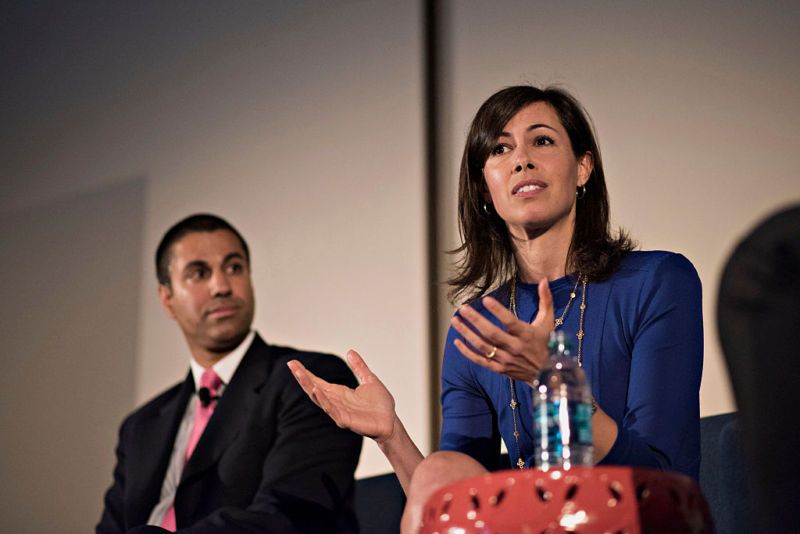“This is crazy. Lowering standards doesn’t solve our broadband problems.”
The Federal Communications Commission chairman’s proposal to lower the country’s broadband standard is “crazy” and does nothing to solve the United States broadband accessibility problems, a Democratic FCC commissioner said yesterday.
The FCC is “proposing to lower US broadband standard from 25 to 10Mbps,” FCC Commissioner Jessica Rosenworcel tweeted. “This is crazy. Lowering standards doesn’t solve our broadband problems.”
Redefining broadband to declare the problem solved
The FCC’s current policy, a holdover from former Chairman Tom Wheeler, is that all Americans should have access to home Internet service with speeds of at least 25Mbps downstream and 3Mbps upstream and access to mobile broadband. If that policy remained in place, having one or the other wouldn’t be enough to be considered “served” in the FCC’s annual analysis of whether broadband is being deployed to all Americans in a reasonable and timely fashion.
But with the FCC now chaired by Republican Ajit Pai, the commission suggested in its annual broadband inquiry last month that Americans might not need a fast home Internet connection. Instead, mobile Internet via a smartphone, with speeds of just 10Mbps downstream and 1Mbps upstream, might be all people need, the FCC now suggests.
The suggestion to lower broadband standards came in a Notice of Inquiry that seeks comment on whether and how the FCC should change the criteria used in its annual broadband deployment analysis. US law authorizes the FCC to take steps to promote competition and remove barriers to infrastructure investment if the commission concludes that broadband deployment is lagging.
The FCC concluded in previous years that deployment is not happening quickly enough. But changing the definition of broadband could let the FCC conclude that a vast swath of the country has sufficient broadband access if they are covered only by wireless carriers offering slower speeds than by cable or fiber ISPs.
The FCC has faced a backlash from Internet users whose comments overwhelmingly opposed lowering broadband standards. Initial comments on the FCC Notice of Inquiry are due by the end of the day today and can be filed at this link. You can continue filing comments until October 6 during the reply comment period.
Potential party-line vote
Senate Democrats also said the FCC should not lower its broadband standards.
Rosenworcel didn’t make an official statement when the Notice of Inquiry was released because she wasn’t on the commission then; she was sworn in for a new term just days later. She served on the FCC before a temporary departure caused by political haggling in the Senate. In her first term on the FCC, Rosenworcel argued that the FCC should set its broadband standard much higher.
“I think our new threshold should be 100Mbps—and gigabit speed should be in our sights,” Rosenworcel said upon the release of last year’s broadband analysis. “I believe anything short of goals like this shortchanges our children, our future, and our digital economy.”
Democratic Commissioner Mignon Clyburn objected to parts of the Notice of Inquiry when it was released, saying that the home broadband speed standard should be raised and that mobile should not be considered a substitute for home Internet.
Pai and fellow Republican Commissioner Michael O’Reilly did not make any statement on the Notice of Inquiry when it was released. But in previous years, Pai criticized the FCC’s then-Democratic majority for concluding that mobile Internet service can’t replace home Internet and dissented from the 2015 decision to raise the broadband speed standard from 4Mbps/1Mbps to its current 25Mbps/3Mbps.
Like Rosenworcel, newly sworn-in Republican Brendan Carr wasn’t yet a commissioner when last month’s Notice of Inquiry was released. Carr was formerly Pai’s wireless, public safety, and international legal advisor and was later appointed by Pai to be FCC general counsel.
The FCC will vote on a final determination of whether broadband deployment is happening quickly enough, sometime after the reply comment period ends. Whatever the FCC decides, it may be a party-line vote of 3-2, with the Republican majority winning.
